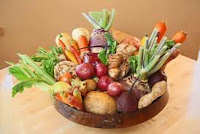As things change externally, our inner body changes in a similar manner and we must care for our bodies accordingly.
Foods For Winter
* Since winter is cold and dry we need to avoid similar food to maintain warmth and moisture within.
 * Warm, home-cooked foods are ideal, cooked with easy-to-digest oils such as ghee (clarified butter) or olive oil, but not deep-fried.
* Warm, home-cooked foods are ideal, cooked with easy-to-digest oils such as ghee (clarified butter) or olive oil, but not deep-fried.* Use cooking methods such as steaming, roasting, stir-frying or poaching in order to heat the food all the way through.
* Avoid raw foods, which are cold in nature such as salads, cold fruits, ice (especially in drinks), ice cream and raw vegetables as these tend to cool the body.
* Incorporate foods that create moisture and warmth. Minimize the consumption of crackers, rice cakes and breads, as they are very dry.
Flavor

* The flavors that nourish and balance the body in the cold, dry, winter season are the sweet, sour and salty tastes. It's best to eat less of the astringent, bitter, and pungent flavors in winter, although all six tastes should be included in your diet.
* From the less ‘favored’ flavors use ginger (unless you run both an extremely hot body temperature and a hot temper) and radish for pungent to keep warm, enjoy leafy greens and dandelion root for bitter, and cranberry or apple for the astringent flavor to aid detoxification during these months.
* Root vegetables and grains will provide the sweet flavor. Refined sugars will create more harm than good.
* For salty flavor reach for small amounts of high quality sea salt and an abundance of sea vegetables.
Food Suggestions
* Warm hearty soups, healthy lean meat and root vegetable stews, whole grains, and roasted nuts.
* Cereals, grains, and legumes: brown rice, oatmeal, millet, soybeans, and mung beans.
 * Meat, poultry and fish.
* Meat, poultry and fish.* Nuts (avoid in excess if you have a lean or lanky body combined with a quick and restless mind.)
* Root vegetables such as yams, sweet potatoes, yucca, potatoes, beets, turnips, ginger, ginseng, taro, burdock, carrots, parsnips, as well as, fennel, onions, chives, scallions, garlic and leeks.
* Herbs, spices, condiments and oils: peppermint, basil, ginger, turmeric, parsley, gogi berries, licorice, cinnamon, cloves, chamomile, pepper, honey, and sesame oil.
* Fruits and nuts: (at room temperature) apples, clementines, cranberries, red grapes, grapefruit, persimmons, dates, figs as well as lemons and limes.
* If eating dairy (choose organic products!) avoid having them cold. Using ghee (clarified butter) is a great butter substitute.
* Hydrate! Hot water and room temperature only. If drinking with a meal, sip hot water slowly.
* The salty taste is attributed to the kidney and bladder, so by adding some salty foods in your diet during winter you can improve the function of these two organs. In Chinese medicine these are the meridians/organs governed by the water element that can be most affected by the dryness of the season. Incorporate some of the following foods to support the kidney and bladder function in winter: burdock root, eggs, fish, miso soup, nuts, tofu, and sea vegetables (such as arame, hijiki, kelp, kombu and wakame.)
* This is not the season to be eating a fat-free salad and cracker diet. Play with steaming or roasting vegetables for salads and if eating things like toast for breakfast, spread a thin layer of ghee or butter on top.
* To promote consistency, regularity and a sense of calm it is important in winter to keep a regular routine with your meals.



4 comments:
Why room temp. for fruits?
In general foods that are cold in temperature are not recommended during the cold season especially if you are an individual that tends to have a harder time warming up than cooling down your body temperature. The body has to apply more energy to digesting cold foods. When we eat foods right out of the fridge, we make it harder for the body to stay warm and rob it of some of the energy it could be using to strengthen immunity at this time of year.
"Nuts (avoid in excess if you have a lean or lanky body combined with a quick and restless mind.)"
This is an interesting warning! Why?
Keeping in mind that each individual is different, when looking in general at people that share these qualities (often referred in Ayurvedic medicine as Vata,) many have a sensitive digestive track that does not do well with excessive amounts of nuts. Nuts can be valuable but in small quantities. They are best soaked and cooked into dishes or blended into nut butters or nut-based-"milks."
In regards to the quick and restless mind: let's put it this way... think about the hyper characteristic movement of squirrels who dine primarily on nuts. Considering how different foods effect our energy, eating trail mix on the go everyday while running around isn't really going to balance and ground a scattered mind... :)
Post a Comment